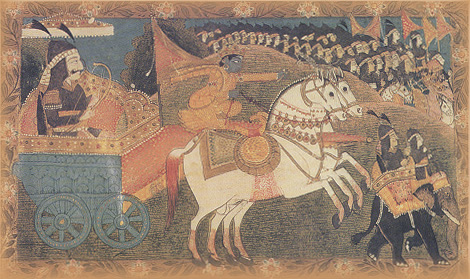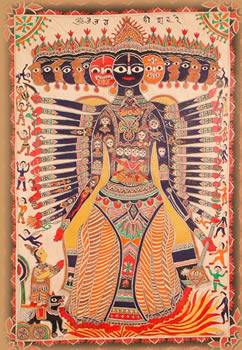
Krishna on the battlefield with Arjuna, a scene
from the Bhagavad Gita
why do you enjoin upon me the terrible action of war?
Bhagavad Gita 3.1
From butter thief to cosmic philosopher... The Bhagavad Gita, one of the most treasured texts of Hinduism, is a long dialogue between the hero Arjuna and Krishna, who appears in this setting as Arjuna’s charioteer. On the eve of a great battle, Arjuna has scruples about the prospect of killing, especially as some of the people on the opposing side are his kin. Krishna enjoins him to perform the duty that is appropriate to his caste—in this instance, that of an aristocratic warrior—but without harbouring any desires about the outcome: “Set your heart upon your work, but never on its reward. Work not for a reward, but never cease to do your work.” (Ibid. 2.47)
A religious text retains its power only to the point that it is capable of sustaining and inspiring subsequent generations. At the time the Gita was written, it was believed that a person’s dharma—that duty specific to their status and stage of life—was determined by the caste into which they were born.
Although we have, on the whole, rightly moved away from the rigid strictures of caste and class, it is still possible to believe in a concept of dharma as the work or vocation for which our nature, nurture and individual passion uniquely prepares us. And from that perspective, the Gita can be seen to teach not the disinterested performance of duty, but rather the following of the divine life. In other words, although there is a lot we can do to prepare—specific training, education, commitment to our gifts and so forth—in the end it is allowing that which we consider to be divine to operate through us that turns our work into a devotion, an act of surrender that allows us to be yoked to the holy: “[the one] who works not for an earthly reward, but does the work to be done, [they are] a sanyasi*, they are a yogi...” (Ibid. 6.1)
A
modern image of a warrior in the very instant of this act of surrender
can be found in the Fellowship of the Ring, when the Uruk-hai
descend upon Weathertop, and Aragorn encourages Frodo to flee. At this
point, Aragorn turns to confront the enemy: the film passes into slow-motion
as he gathers into himself all his skill, courage and resolve. And,
in
a gesture of great inner peace, he salutes with his sword and surrenders
to the moment. Although the action that follows is violent and bloody,
he
never deviates from his commitment to his pledge to protect Frodo and
rid the world of the dangers of the ring of power.
*Person
devoted to the religious life.

Vishvarupa
Krishna
reveals his transcendent nature
(vishva, ‘the universe’, rupa, ‘form,
the shape of a thing’.) Such
an
iconic representation is used by devotees for the purposes of meditation,
in the hope that they might attain the same cosmic vision granted
to Arjuna.
that move and move not, and whatever your soul
may yearn to see. See it all as One in me.
Bhagavad Gita 11.7
Arjuna has listened to all Krishna has said, and then he asks him to reveal his divine nature. The vision that Krishna grants him—although a blessing and a boon—makes Arjuna’s hair stand on end, so much so that Krishna takes pity on his friend and returns to his human incarnation: “Be not afraid, be not bewildered, on seeing this terrific form of mine. Free from fear and glad of heart behold again my other form.” (Ibid. 11.49)
Many people have experienced a moment when it seems as if the veil of separation is rent and one is granted a vision of the unity of all existence. Such an encounter with the numinous can be life-changing and affirming, leaving the individual with a sense of meaning in life, however impossible to define. Others, not seeing their own connection to this cosmic whole, have experienced such moments as a confrontation with a transcendent power utterly alien and possessed of all that is good and light: to paraphrase what the patriarch Abraham once said to his god, “Before thee, I am nothing but dust and ashes...”
There are also those who have been overwhelmed by such a vision, their identity fractured, in some instances ending up with the belief that it is they, themselves, who are the source of the ultimate power. But thankfully this is an extreme. For most of us it is a question of finding the proper balance, of being open to the influence of that which some of us call holy, perhaps being temporarily boggled by the experience, but then able to digest the inspiration, come down to earth and put it to creative use.